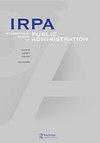证据包容性沟通:指导葡萄牙、巴西、新西兰和美国的危机领导成果
International Review of Public Administration
Pub Date : 2023-07-03
DOI:10.1080/12294659.2023.2246738
引用次数: 0
摘要
虽然领导沟通的本质被认为是危机管理的关键,但定义成功沟通的独特特征往往是未知的。最近关于这一主题的观点强调了将政治和基于价值的考虑结合起来的重要性,以便在危机期间实现平衡的沟通方式。本文通过检验一种证据包容型的领导沟通风格是否倾向于在危机管理中产生更成功的结果,对这些说法进行了实证检验。我们比较了葡萄牙、巴西、美国和新西兰领导人的演讲,以评估决策的主要显性知识和价值基础。我们的研究结果表明,在应对COVID-19大流行等紧迫而复杂的问题时,危机应对的成功与领导者有效传达基于证据的叙事(包括不同证据来源)的能力有关。本文章由计算机程序翻译,如有差异,请以英文原文为准。
Evidence-inclusive communication: steering crisis leadership outcomes in Portugal, Brazil, New Zealand, and the US
ABSTRACT While the essence of leadership communication is recognized as a linchpin in crisis management, the distinct characteristics that define successful communication are often unknown. Recent perspectives on the topic highlight the importance of incorporating political and value-based considerations to achieve a balanced communication style during a crisis. This article empirically tests these claims by examining whether an evidence-inclusive communication style of leadership tends to yield more successful outcomes in crisis management. We compare speeches by leaders from Portugal, Brazil, the United States, and New Zealand, to assess the main explicit knowledge and value bases of decision-making. Our findings suggest that success of a crisis response is associated with a leader’s ability to effectively communicate an evidence-based narrative, inclusive of different evidence sources, when tackling pressing and complex issues such as the COVID-19 pandemic.
求助全文
通过发布文献求助,成功后即可免费获取论文全文。
去求助
来源期刊

International Review of Public Administration
Social Sciences-Public Administration
CiteScore
2.00
自引率
0.00%
发文量
21
期刊介绍:
The International Review of Public Administration (ISSN 1229-4659) is published biannually by the Korean Association for Public Administration (KAPA) to provide a worldwide audience with the opportunity for communication and further understanding on issues of public administration and policy. There will be a triple-blind peer review process for all submissions of articles of general interest. There are no particular limitations on subject areas as long as they are related to the field of public administration and policy or deal with public employees. Articles should be analytic and demonstrate the highest standards of excellence in conceptualization, craftsmanship, and methodology.
 求助内容:
求助内容: 应助结果提醒方式:
应助结果提醒方式:


